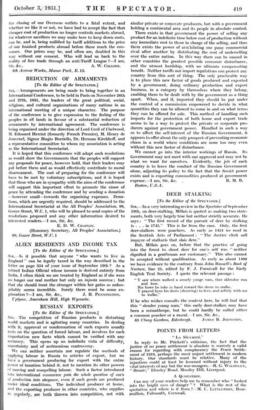RUSSIAN EXPORTS
[To the Editor of the SPECTATOR.]
Sin,--The competition of Russian products is disturbing world markets and is agitating many countries. In dealing with it, approval or condemnation of such exports usually rests on the question of forced labour, and involves for each importation new facts which cannot be verified with any accuracy. This opens up an indefinite vista of difficulty, uncertainty and of acrimonious controversy.
We can neither ascertain nor regulate the methods of applying labour in Russia to articles of export, but we have a government producing for export with the entire power of taxation behind it, not to mention its other powers of moving and compelling labour. Such a factor introduced into international commerce puts the whole question of costs of production into abeyance, even if such goods are produced under ideal conditions. The individual producer at home, and the exporting producer in other countries, who supplies us regularly, are both thrown into competition, not with
similar private or corporate producers, but with a government holding a continental area and its people in absolute control.
There exists in that government the power of selling any product for an indefinite time below cost of production without any immediate cost to those in charge of the selling, and thus there exists the power of annihilating one puny commercial rival after another by distributing the cost of underselling over the entire nation. In this way there can be caused in other countries the greatest possible economic disturbance, and the utmost hardship, with no ultimate compensating benefit. 'Neither tariffs nor import regulations can protect any country from this sort of thing. The only practicable way is to place this new factor of goods produced and exported by a government, doing ordinary production and export business, in a category by themselves where they belong, enabling them to be dealt with by the government as a thing apart. When, and if, imported they should be put under the control of a commission empowered to decide in what quantities they can be allowed to come in and on what terms they can be offered for sale. This method of handling such imports for the protection of both home and export trade seems to be a way to protect the private or corporate pro- ducers against government power. Handled in such a way as to affect the self-interest of the Russian Government, it appears to offer about the only prospect of preventing economic chaos in a world where conditions are none too easy even without this new factor of disturbance.
We cannot go into the interior workings of Russia. Its Government may not meet with our approval and may not be what we want for ourselves. Evidently, the job of each country is to leave the conduct of the Russian Government alone, adjusting its policy to the fact that the Soviet power exists and is exporting commodities produced at government










































 Previous page
Previous page